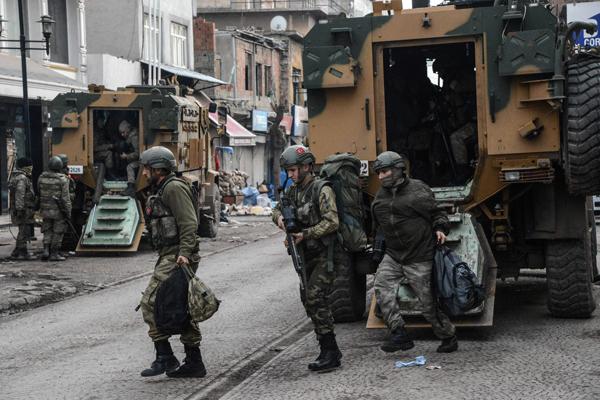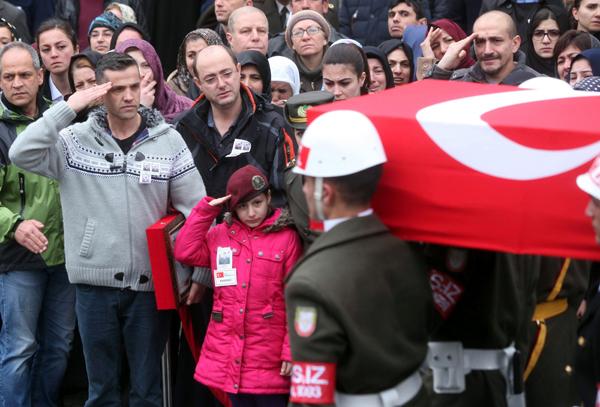You are here
Turkey starts repairs on Iraqi Kurdish oil pipeline as violence flares
By Reuters - Feb 27,2016 - Last updated at Feb 29,2016

Turkish soldiers prepare themselves for military action during a curfew on Friday at Diyarbakir's historical Sur district, eastern Turkey (AFP photo)
ISTANBUL/DIYARBAKIR — Turkey has begun work to repair a pipeline taking crude oil from northern Iraq to the Mediterranean through its restive southeast and aims to restore flows soon, the Turkish energy ministry said on Saturday.
The pipeline, which has been repeatedly sabotaged in recent months, normally carries some 600,000 barrels per day (bpd) of crude from Iraq's autonomous Kurdistan region and the disputed Kirkuk oil fields to the Port of Ceyhan for export.
Rising security threats in Turkey's southeast mean Iraqi Kurdish exports to world markets through the pipeline could remain halted for another two weeks, Turkish shipping and industry sources said on Friday.
The energy ministry said the pipeline was most recently suspended on February 17 due to temporary security measures.
It said militants from the Kurdistan Workers Party (PKK), who have waged a three-decade insurgency in Turkey's southeast, carried out a bomb attack on the pipeline in the Idil district of Sirnak province on February 25.
The ministry said there was no fire as a result of the bomb as the crude flow had already been stopped, but 101cm and 116cm diameter pipes were damaged.
"The ministry of energy has launched work to repair the damage to the oil pipeline and the security forces have taken necessary steps to ensure the pipeline's safety. We expect to restart the oil delivery soon," it said in a statement.
The outage, one of the longest in the past two years, is a major blow to Iraq's autonomous Kurdistan region which depends on revenue from oil exports via the pipeline as it fights with Daesh and is struggling to avert economic collapse amid slumping energy prices.
It also highlights how intertwined Iraqi Kurdistan's economic woes are with the deteriorating security in Turkey's predominantly Kurdish southeast, engulfed in the worst violence since the 1990s after a two year-long ceasefire between the state and Kurdish militants collapsed last July.
The Kurdistan region's Prime Minister Nechirvan Barzani told reporters on Saturday he could not confirm that the PKK was to blame for the outage.
"There are military operations in the area, and we cannot confirm that it is blown up, but it is certainly broken," Barzani was quoted by the local media as saying when asked who was behind the sabotage.
Turkey's energy ministry said security forces had detonated explosives set at several points along the pipeline. Security sources told Reuters the devices were set in the Yeni Mahalle district of Idil on the border with Iraq and Syria, one of the flashpoints in the latest violence.
The security sources said around 4,000 gendarmes and special force police officers had been involved in operations to clear barricades and ditches set up by militants in Yeni Mahalle. Drones were being used to locate the militants, who were then being targeted by military shelling and snipers, they said.
The PKK, considered a terrorist group by Turkey, the United States and the European Union, launched a separatist armed rebellion against the Turkish state in 1984 in a conflict that has killed more than 40,000 people, mostly Kurds.
The PKK says it is fighting for autonomy for Turkey's large ethnic Kurdish minority. It has sealed off entire districts of some towns and cities in the southeast and declared autonomy, prompting the security forces to step up their operations.
Related Articles
DIYARBAKIR, Turkey — Turkish military helicopters killed 12 Kurdish militants in strikes near the southeastern border with Syria on Wednesda
ISTANBUL — Turkey's military said on Monday it had killed 14 militants in a drive against the outlawed Kurdistan Workers Party (PKK) in the
DIYARBAKIR, Turkey — Three soldiers and 28 Kurdish militants have been killed in air strikes and clashes over the past two days in Turkey's
















